"The war has no female face." Memories of Female Veterans
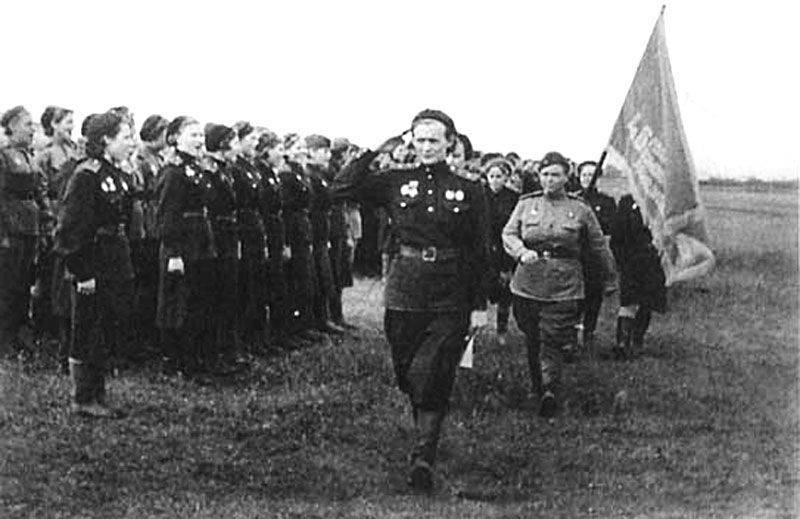
On the fronts of the Great Patriotic War, more than 1 million women fought in the Soviet army. Not less than they took part in the partisan and underground resistance. They were from 15 to 30 years. They owned all military specialties - pilots, tankmen, submachine gunners, snipers, machine gunners ... Women not only saved, as it was before, working as sisters of mercy and doctors, but they also killed.
In the book, women talk about war, about which men have not told us. We did not know such a war. The men talked about the exploits, the movement of the fronts and military leaders, and the women talked about something else - how terrible to kill the first time ... or to go after a battle on the field where the dead lie. They are scattered like potatoes. All the young, and sorry for all - and the Germans, and their Russian soldiers.
After the war, women had another war. They hid their military books, their injuries - because they had to learn to smile again, to go in high heels and get married. And the men forgot about their fighting friends, betrayed them. They stole the Victory from them. Not divided.
Svetlana Aleksievich
writer, journalist.
Memories of women veterans. Cuts from the book by Svetlana Alexievich.
"We drove for many days ... We went out with girls to a station with a bucket to get some water. Looked around and gasped: one by one the trains went, and there were some girls. They sing. They wave to us - who are scarves, who are pilots. It became clear : there are not enough men, they died in the ground, or in captivity. Now, instead of them ...
Mom wrote me a prayer. I put it in the medallion. Maybe it helped - I returned home. I kissed the locket before the fight ... "
Anna Nikolaevna Hrolovich, nurse.
“To die ... I was not afraid to die. Youth, perhaps, or something else ... Around death, always death is near, but I did not think about it. We did not talk about it. She circled, circled somewhere close, but all - by.
Once at night reconnaissance in the area of our regiment was conducted by a whole company. By dawn, she had departed, and from the neutral strip there was a groan. Left wounded.
- "Do not go, they will be killed, - the soldiers did not let me, - see, it is already getting light."
Did not obey, crawled. She found the wounded man, dragged him eight hours, tied a belt by the arm.
Dragged the living.
The commander found out, announced in the heat of the moment five days in jail for unauthorized absenteeism.
And the deputy regiment commander reacted differently: "Deserves rewards."
At nineteen, I had the medal "For Courage".
At nineteen, she turned gray. At nineteen in the last battle both lungs were shot through, the second bullet passed between two vertebrae. Paralyzed legs ... And I was considered killed ... At the age of nineteen ... I have a granddaughter like that now. I look at it and I do not believe it. Baby
When I came home from the front, my sister showed me the burial ... I was buried ... "
Nadezhda Vasilyevna Anisimova, medical instructor of a machine-gun company.
“At this time, the German officer gave instructions to the soldiers. A carriage came up, and the soldiers were passing a load along the chain. This officer stood, ordered something, then disappeared. I see that he has already appeared twice, and if we once again miss that, that's all. His miss. And when he appeared the third time, the same instant - it will appear, it will disappear - I decided to shoot. I made up my mind, and suddenly such a thought flashed: this is a man, even though he is an enemy, but a man, and my hands somehow began to shake, a shiver went all over my body, a chill. Some kind of fear ... Sometimes this feeling still comes back to me in a dream ... After plywood targets, shooting a living person was difficult. I see him in an optical sight, I see well. As if he is close ... And inside I have something against ... Something does not, I can not decide. But I pulled myself together, pulled the trigger ... He waved his hands and fell. He was killed or not, I do not know. But after that a shiver took me even more, some kind of fear appeared: I killed a man ?! It was necessary to get used to this very thought. Yes ... In short - the horror! Not forget…
When we arrived, we began to tell in our platoon what had happened to me, we held a meeting. Our Komsomol was Klava Ivanova, she urged me: "They should not be pitied, but should be hated." Her father's Nazis killed. We used to be drunken, and she asks: "Girls, don't, we will defeat these reptiles, then we will sing."
And not immediately ... We did not immediately succeed. Not a woman's thing - to hate and kill. Not our ... I had to convince myself. Persuade…"
Maria Ivanovna Morozova (Ivanushkina), corporal, sniper.
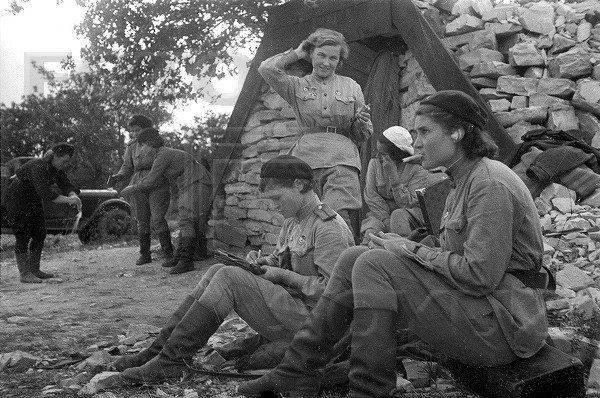
“Once a man was struck by two hundred wounded in a barn, and I alone. The wounded were brought right from the battlefield, a lot. It was in some village ... Well, I don’t remember, so many years have passed ... I remember that for four days I didn’t sleep, didn’t sit down, everyone shouted: "Sister! Sister! Help, my dear!" I ran from one to another, once I stumbled and fell, and immediately fell asleep. Awakened by a scream, the commander, a young lieutenant, also injured, raised himself to a healthy side and shouted: "Silence! Silence, I order!" He realized that I was powerless, and everyone called, it hurts: "Sister! Sister!" I jumped up as I ran - I don’t know where, what. And then the first time I went to the front, I cried.
And so ... You never know your heart. In winter, we were led past our unit of captured German soldiers. They walked frozen, with ragged blankets on their heads, burned with overcoats. And the frost is such that the birds fell on the fly. The birds froze.
In this column, one soldier was walking ... A boy ... Tears were frozen on his face ...
And I was taking bread to the dining room in a wheelbarrow. He can not take his eyes off this car, he does not see me, only this car. Bread ... Bread ...
I take and break off one loaf and give it to him.
He takes ... Takes and does not believe. Do not believe ... Do not believe!
I was happy…
I was happy that I can not hate. I myself was surprised then ... "
Natalia Ivanovna Sergeeva, ordinary, a nurse.
"On the thirtieth of May forty-three ...
Exactly at one o'clock there was a massive raid on Krasnodar. I jumped out of the building to see how we managed to send the wounded from the train station.
Two bombs landed in the shed where the ammunition was stored. Before my eyes, the boxes flew up above the six-story building and exploded.
A hurricane wave threw me against the brick wall. Fainted ...
When I came to, it was already evening. She lifted her head, tried to squeeze her fingers - they seemed to move, she barely opened her left eye and went into the ward, all covered in blood.
In the corridor I meet our older sister, she did not recognize me, asked:
- "Who are you from?"
She came closer, gasped and said:
“Where have you been for so long, Xenia? The wounded are hungry, but you are not.”
Quickly bandaged the head, left arm above the elbow, and I went to get dinner.
His eyes were dark, sweat poured hail. Began to hand out dinner, fell. Brought to consciousness, and only heard: "Hurry! Hurry!" And again - "Hurry up! Hurry!"
A few days later they took more blood from me for the seriously wounded. People died ... ... During the war, I changed so much that when I came home, my mother did not recognize me. ”
Ksenia Sergeevna Osadcheva, ordinary, sister-mistress.
“The first guards division of the national militia was formed, and we, several girls, were taken to the medical battalion.
I called my aunt:
- I am going to the front.
At the other end of the wire I was answered:
- Marsh home! Dinner has already caught a cold.
I hung up. Then I felt sorry for her, madly for her. The blockade of the city began, the terrible Leningrad blockade, when the city was half extinct, and she was left alone. Old
I remember let me go in dismissal. Before I went to my aunt, I went to the store. Before the war, she loved candy. I say:
- Give me some candy.
The saleswoman looks at me like I'm crazy. I did not understand: what are the cards, what is the blockade? All the people in the line turned to me, and I have a rifle more than me. When we were given them, I looked and thought: "When will I grow up to this rifle?" And all of a sudden they began to ask, the whole line:
- Give her some candy. Cut out our coupons.
And they gave me ...
I was treated well in the medical battalion, but I wanted to be a scout. She said that I would run to the front line if they did not let me go. They wanted to exclude from the Komsomol for this, for not submitting to the military regulations. But still I ran away ...
The first medal "For courage" ...
The battle began. Squall fire. The soldiers lay down. Team: "Forward! For the Motherland!", And they lie. Again, the team again lie. I took off my hat to see: the girl rose ... And they all got up, and we went into battle ...
They handed me a medal, and on the same day we went on a mission. And for the first time in my life I happened ... Our ... Women's ... I saw blood in my body, like a shout:
- I was hurt ...
In intelligence with us was a paramedic, already an elderly man.
He to me:
- Where did you hurt?
- I do not know where ... But the blood ...
He told me like a father ...
I went to intelligence after the war for about fifteen years. Every night. And such dreams: either my machine gun refused, then we were surrounded. You wake up - your teeth creak. Remember - where are you? There or here?
The war ended, I had three wishes: first, at last I would not crawl on my stomach, but I would ride a trolleybus, second, buy and eat a whole white loaf, third, sleep in a white bed and make the sheets crunch. White sheets ... "
Albina Alexandrovna Gantimurova, senior sergeant, scout.
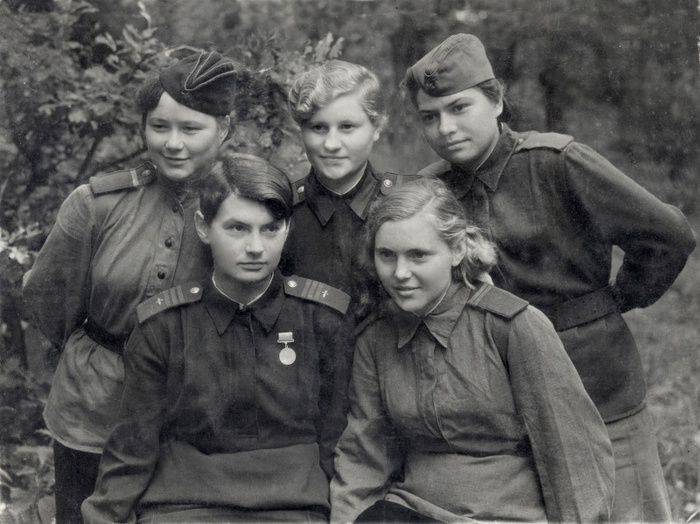
“I am waiting for my second child ... My son is two years old and I am pregnant. This is war. And my husband at the front. I went to my parents and did ... Well, you understand?
Abortion…
Although it was then forbidden ... How to give birth? Around tears ... War! How to give birth in death?
She graduated from coders, sent to the front. I wanted to avenge my baby, for not giving birth to him. My girl ... should have been born a girl ...
Asked to the front. Left at headquarters ... "
Lyubov Arkadyevna Charnaya, junior lieutenant, cryptographer.
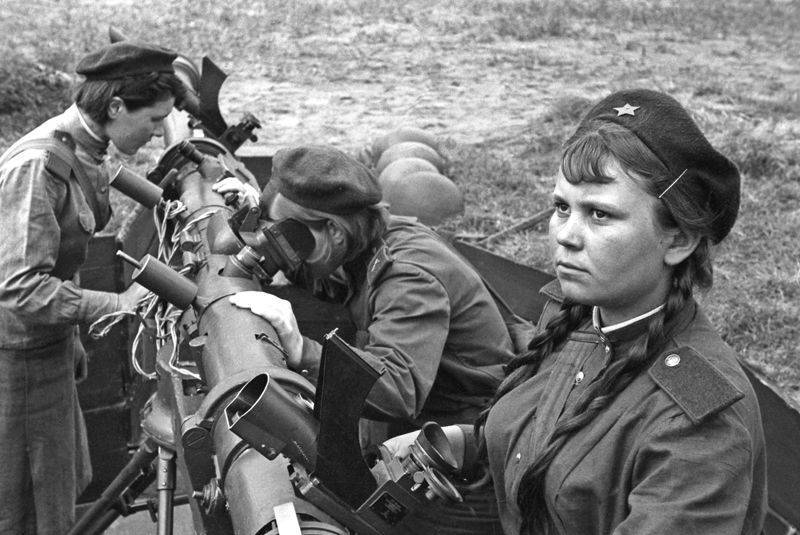
“The forms on us were not to be hurt:“ they gave a new one, and in a couple of days she was covered in blood.
My first wounded was Senior Lieutenant Belov, my last wounded was Sergey Petrovich Trofimov, a mortar platoon sergeant. In the seventieth year, he came to visit me, and I showed my daughters his wounded head, which is still a big scar.
I brought four hundred and eighty one wounded out of the fire.
Someone from the journalists counted: a whole infantry battalion ...
They dragged men on themselves, two or three times heavier than us. And the wounded they are even harder. You drag him yourself weapon, and on it still overcoat, boots.
Pick up eighty kilograms and drag.
Reset ...
You go for the next, and again seventy-eighty kilograms ...
And so five or six times in one attack.
And you yourself forty eight kilograms - ballet weight.
Now I can not believe ... I can not believe myself ... "
Maria Petrovna Smirnova (Kukharskaya), medical instructor.
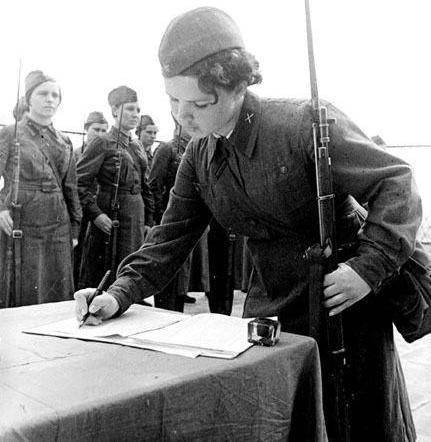
"Forty-second year ...
We go to the task. We crossed the front line, stopped at a cemetery.
The Germans, we knew, are located five kilometers from us. It was night, all the time they were throwing flares.
Parachute.
These rockets burn for a long time and illuminate far the whole terrain.
The platoon leader led me to the edge of the cemetery, showed me where the rockets were coming from, where the bushes from which the Germans might appear.
I am not afraid of the dead, I was not afraid of the cemetery since childhood, but I was twenty-two years old, I was in the post for the first time ...
And during those two hours I turned gray ...
The first gray hair, a whole strip, I found myself in the morning.
I stood and looked at this bush, it rustled, moved, it seemed to me that Germans were coming from there ...
And someone else ... Some kind of monster ... And I am alone ...
Is it a woman's business - to stand at night at the cemetery?
Men were easier to relate to everything, they were ready for this idea that you should stand at the post, you must shoot ...
But for us all the same it was a surprise.
Or make the transition to thirty kilometers.
With combat display.
In the heat.
The horses fell ... "
Vera Safronovna Davydova, an ordinary infantryman.
"Attacks melee ...
What did I remember? I remembered the crunch ...
The melee begins: and immediately this crunch - the cartilage breaks, the human bones crack.
Animal screams ...
When the attack, I go with the fighters, well, a little behind, consider - next.
All before my eyes ...
Men stab each other. Finish off. Break down. They strike with a bayonet in the mouth, in the eye ... In the heart, in the stomach ...
And this ... How to describe? I am weak ... I am weak to describe ...
In a word, women do not know such men, they do not see them at home. Neither women nor children. Terribly done in general ...
After the war, she returned home to Tula. She cried all the time at night. At night, mom and sister sat with me ...
I woke up with a scream of my own ... "
Nina Vladimirovna Kovelenova, senior sergeant, medical instructor of a rifle company.
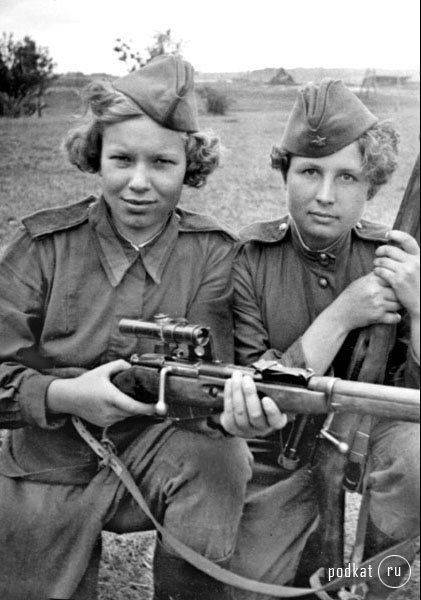
“A doctor came, made a cardiogram, and they ask me:
- When did you have a heart attack?
- What is a heart attack?
- You have all the heart in the scars.
And these scars, apparently, from the war. You go over the target, you all shakes. The whole body is covered with trembling, because the fire is below: the fighters shoot, the anti-aircraft guns shoot ... Several girls were forced to leave the regiment, they could not stand it. We flew mostly at night. For a while we were tried to be sent on assignments in the afternoon, but they immediately abandoned this idea. Our "On-2" shot from a machine gun ...
We made up to twelve sorties per night. I saw the famous pilot-ace Pokryshkin, when he flew out of a combat flight. It was a strong man, he is not twenty years old and not twenty-three, like us: while the plane was being refueled, the technician managed to take off his shirt and unscrew it. From it flowed, as if he had been in the rain. Now you can easily imagine what was happening with us. You arrive and you cannot even get out of the cabin, they pull us out. Could not carry the tablet, pulled on the ground.
And the work of our girls gunsmiths!
They needed four bombs - these are four hundred kilograms - to be hung up to the car manually. And so all night — one plane went up, the second got on.
The organism was reorganized to such an extent that we were not women the whole war. We have no women's affairs ... Monthly ... Well, you understand ...
After the war, not everyone was able to give birth.
We all smoked.
And I smoked, it feels like you calm down a bit. If you arrive, you are all trembling, if you smoke, you will calm down.
We went in leather jackets, trousers, tunic, in winter there was also a fur jacket.
Something masculine appeared involuntarily both in the gait and in the movements.
When the war ended, we sewed khaki dresses. We suddenly felt that we were girls ... "
Alexandra Semenovna Popova, Guard lieutenant, navigator
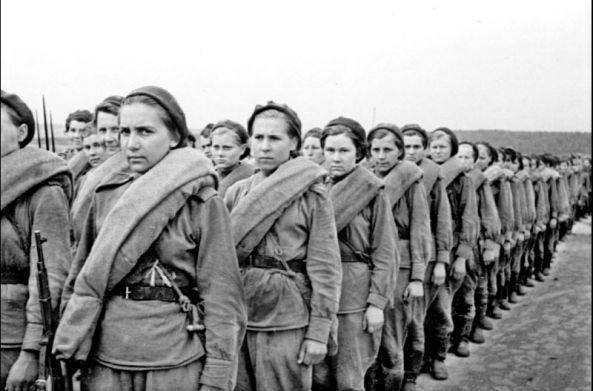
"We arrived at Stalingrad ...
There were mortal battles. The most deadly place ... Water and land were red ... And now from one bank of the Volga we have to cross over to the other.
Nobody wants to listen to us:
- "What? Girls? Who do you need to hell here! We need arrows and machine-gunners, not communications operators."
And we are many, eighty people. By the evening, the girls who were bigger were taken, but we are not taken together with one girl.
Small stature. Not grown.
They wanted to leave in reserve, but I raised such a roar ...
In the first battle, the officers pushed me off the parapet, I stuck my head out to see everything myself. Some curiosity was, children's curiosity ...
Naive!
The commander yells:
- "Private Semenova! Private Semenova, you are crazy! Such a mother ... Kill!"
I could not understand this: how can it kill me if I just arrived at the front?
I still did not know what kind of death is ordinary and unintelligible.
Do not beg her, do not persuade.
The people's militia was brought up in the old lorries.
Old men and boys.
They were given out two grenades and sent into battle without a rifle, the rifle had to be obtained in battle.
After the fight, there was no one to dress ...
All killed ... "
Nina Alekseevna Semenova, ordinary soldier, signaller.
“Before the war, it was rumored that Hitler was preparing to attack the Soviet Union, but these conversations were strictly stopped. Overruled by the relevant authorities ...
Are you clear what these organs are? NKVD ... security officers ...
If people were whispering, then at home, in the kitchen, and in communal apartments - only in their own room, behind closed doors or in the bathroom, opening a tap with water in front of it.
But when Stalin spoke ...
He turned to us:
- "Brothers and sisters…"
Everyone has forgotten their grievances ...
Our uncle was in the camp, my mother's brother, he was a railroad worker, an old communist. He was arrested at work ...
Is it clear to you who? NKVD ...
Our beloved uncle, and we knew that he was not guilty of anything.
They believed.
He had awards since the civil war ...
But after Stalin's speech, mother said:
- "We will defend our homeland, and then we'll figure it out."
Homeland loved by all. I ran immediately to the military enlistment office. I ran with a sore throat, my temperature was still not completely asleep. But I could not wait ... "
Elena Antonovna Kudina, private, driver.
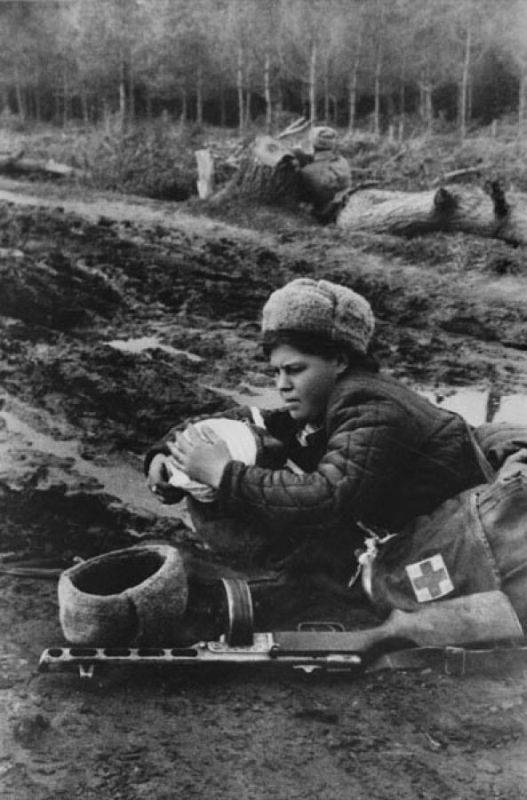
“From the first days of the war, reorganizations began in our flying club: men were taken away, and we, women, replaced them.
They taught the cadets.
There was a lot of work, from morning to night.
My husband went to the front one of the first. I only have a photo left: we stand with him alone at the plane, in flying helmets ...
We now lived together with our daughter, lived all the time in the camps.
How did they live? I will close it in the morning, I will give porridge, and from four in the morning we are already flying. I come back to the evening, and she will eat or not eat, all smeared with this porridge. Already does not even cry, but only looks at me. Her eyes are big, like her husband ...
By the end of 1941 they had sent me a funeral: my husband died near Moscow. He was a flight commander.
I loved my daughter, but took her to his family.
And she began to ask for the front ...
Last night ...
All night I stood at the crib on my lap ... "
Antonina G. Bondareva, Guard Lieutenant, Senior Pilot.
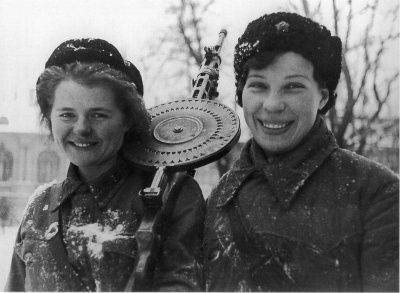
“I had a small child, in three months I took him on an assignment.
The commissioner sent me, and he cried ...
She brought medicines from the city, bandages, serum ...
Between the handles and between the legs lay, diaper tie and carry. In the forest, the wounded die.
Need to go.
It should!
No one else could pass, could not get through, everywhere German and police posts, one I passed.
With baby.
He is in my swaddling clothes ...
Now it's scary to confess ... Oh, hard!
That there was a temperature, the baby cried, rubbed it with salt. He is then red all over, the rash will go over him, he screams, climbs out of his skin. Stop at the post:
- "Typhus, pan ... Typhus ..."
They are driven to leave soon:
- "Vek! Vek!"
And rubbed with salt, and put garlic. And little child, I was still breastfeeding him. How to go through the posts, go into the forest, crying, crying. I scream! So baby sorry.
And in a day or two I go again ... "
Maria Timofeevna Savitskaya-Radyukevich, partisan connected.
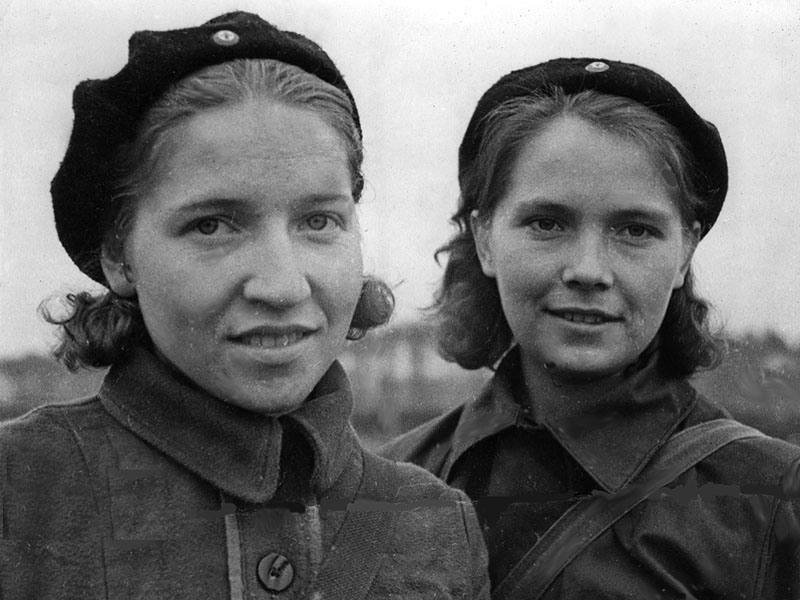
“They sent me to the Ryazan Infantry School.
Released from there by the commanders of machine-gun units. The machine gun is heavy, you drag it on yourself. Like a horse. Night. Standing at the post and catching every sound. Like a lynx. Watching every rustle ...
In war, as they say, you are half human, and half beast. This is true…
There is no other way to survive. If you are only a man - you will not survive. Baska will carry! In war, you need to remember something about yourself. Something like this ... Remembering something from when the person was not entirely human ... I am not a very learned, simple accountant, but I know that.
I came to Warsaw ...
And all on foot, infantry, as they say, the proletariat of war. Crawling on his belly ... Do not ask me more ... I do not like books about war. About heroes ... We walked sick, coughing, not sleeping, dirty, poorly dressed. Often hungry ...
But we won! ”
Lyubov Ivanovna Lyubchik, platoon commander of machine gunners.
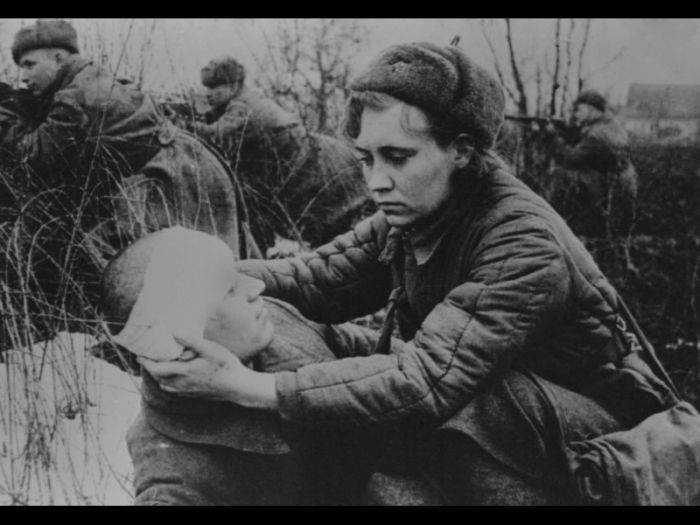
“Once upon a time ...
For some reason, I can't remember it without tears ...
It was spring. We shot out and walked back. And I picked up the violets. A small bouquet. Narwhal and tied him to the bayonet. So go. Returned to the camp. The commander built everyone and calls me.
I'm out…
And I forgot that I have violets on a rifle. And he began to scold me:
“A soldier must be a soldier, not a collector of flowers.”
He wondered how it was possible to think about flowers in such an environment. The man was not clear ...
But I didn't throw away the violets. I quietly took them off and put them in my pocket. I was given three outfits for these violets out of turn ...
Another time standing at the post.
At two o'clock in the morning they came to replace me, but I refused. Sent a changer to sleep:
- "You will stand in the afternoon, and I now."
I agreed to stand all night until dawn, just to listen to the birds. Only at night something resembled the old life.
Peaceful.
When we went to the front, we walked down the street, people were standing by a wall: women, old people, children. And everyone was crying: "The girls are going to the front." We were a whole battalion of girls.
I'm driving…
We collect the dead after the battle, they are scattered across the field. All young. The boys. And suddenly - the girl lies.
The dead girl ...
Everything is silent here ... "
Tamara Illarionovna Davidovich, sergeant, driver.
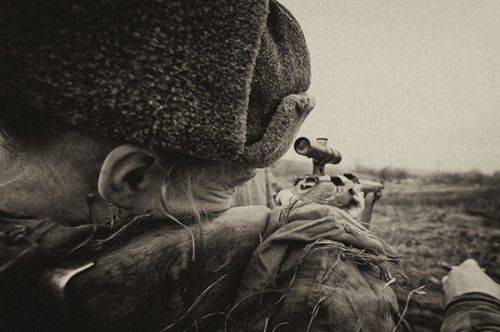
"Dresses, high heels ...
As we feel sorry for them, they were buried in pouches. In the day in boots, and in the evening, at least a little in the shoes in front of the mirror.
Raskova saw - and in a few days the order: send all women's clothes home in packages.
That's it!
But we studied the new plane for six months instead of two years, as it should be in peacetime.
In the first days of training, two crews died. They put four coffins. All three regiments, we all wept bitterly.
Raskova spoke:
- Friends, wipe away tears. This is our first loss. There will be a lot of them. Squeeze your heart into a fist ...
Then, in the war, they buried without tears. Stop crying.
We flew fighters. The height itself was a terrible load for the entire female body, sometimes the belly pressed directly into the spine.
And our girls flew and shot down aces, and what aces!
That's it!
You know, when we walked, the men looked at us with surprise: pilots are coming.
They admired us ... "
Claudia Ivanovna Terekhova, captain aviation.
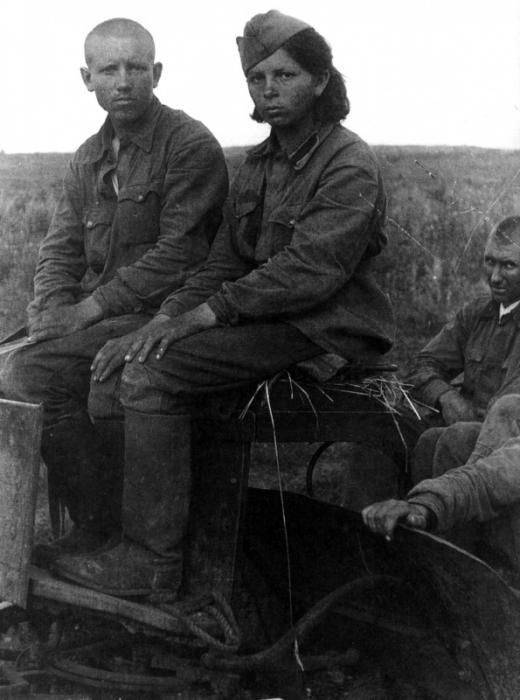
“Someone betrayed us ...
The Germans learned where the parking lot of the partisan detachment. They cordoned off the forest and the approaches to it from all sides.
We hid in wild thickets, we were saved by swamps, where the punishers did not go.
The quagmire.
And the technique, and people she was holding tight. For several days, for weeks, we stood up in the water.
With us was a radio operator, she recently gave birth.
A hungry child ... Asks for a breast ...
But the mother herself is hungry, there is no milk, and the baby is crying.
Punishers near ...
With dogs ...
If the dogs hear, all will perish. The whole group is about thirty ...
Do you understand?
The commander makes a decision ...
No one decides to transfer the order to his mother, but she guesses herself.
He lowers the bundle with the child into the water and holds it there for a long time ...
The child no longer screams ...
Nizvuka ...
And we can't raise our eyes. Neither the mother nor each other ... "
From a conversation with a historian.
- when for the first time in stories women appeared in the army?
- Already in the IV century BC, women fought in Greek troops in Athens and Sparta. Later, they participated in the campaigns of Alexander of Macedon.
Russian historian Nikolai Karamzin wrote about our ancestors: “Slavic women sometimes went to war with their fathers and spouses, not fearing death: so during the siege of Constantinople in 626, the Greeks found many female corpses between the killed Slavs. Mother, raising children, was preparing them to be warriors. "
- And in the new time?
- For the first time - in England in the 1560-1650 years began to form hospitals, which served as female soldiers.
- What happened in the twentieth century?
- The beginning of the century ... In the First World War in England, women were already taken into the Royal Air Force, the Royal Auxiliary Corps and the Women's Legion of Motor Vehicles were formed - in the amount of 100 thousand people.
In Russia, Germany, France, many women also began to serve in military hospitals and sanitary trains.
And during World War II, the world witnessed a female phenomenon. Women served in all branches of the military in many countries of the world: in the British army - 225 thousand, in the American - 450- 500 thousand, in the German army - 500 thousand ...
About a million women fought in the Soviet army. They mastered all military specialties, including the most "masculine." There was even a language problem: the words “tanker”, “infantryman”, “machine gunner” did not have a feminine gender before that time, because a woman had never done this work. Female words were born there, in the war ...
- Svetlana Aleksievich
- http://www.alexievich.info
- http://radulova.livejournal.com
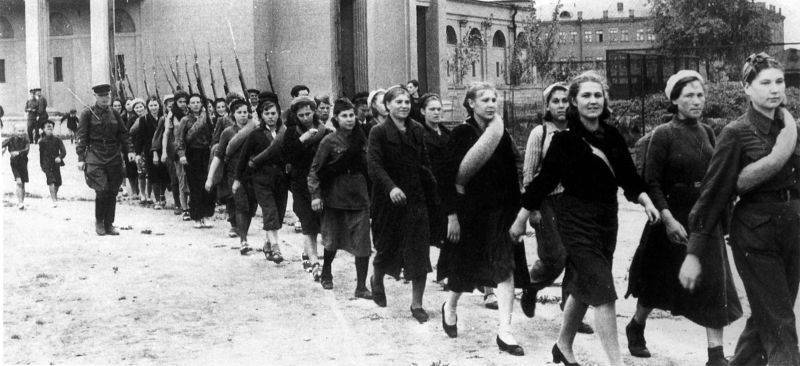
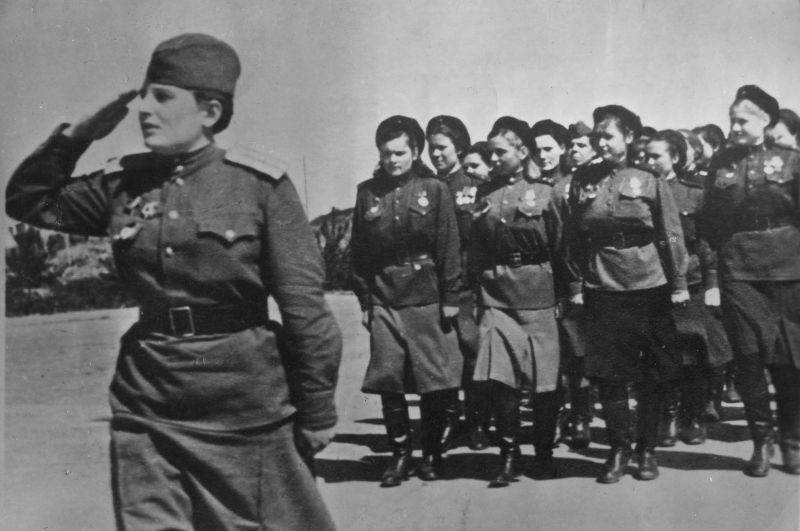
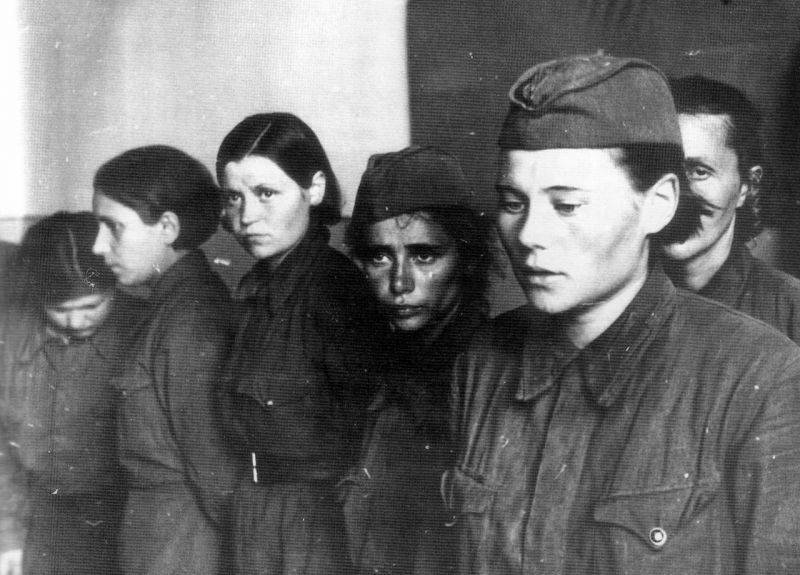
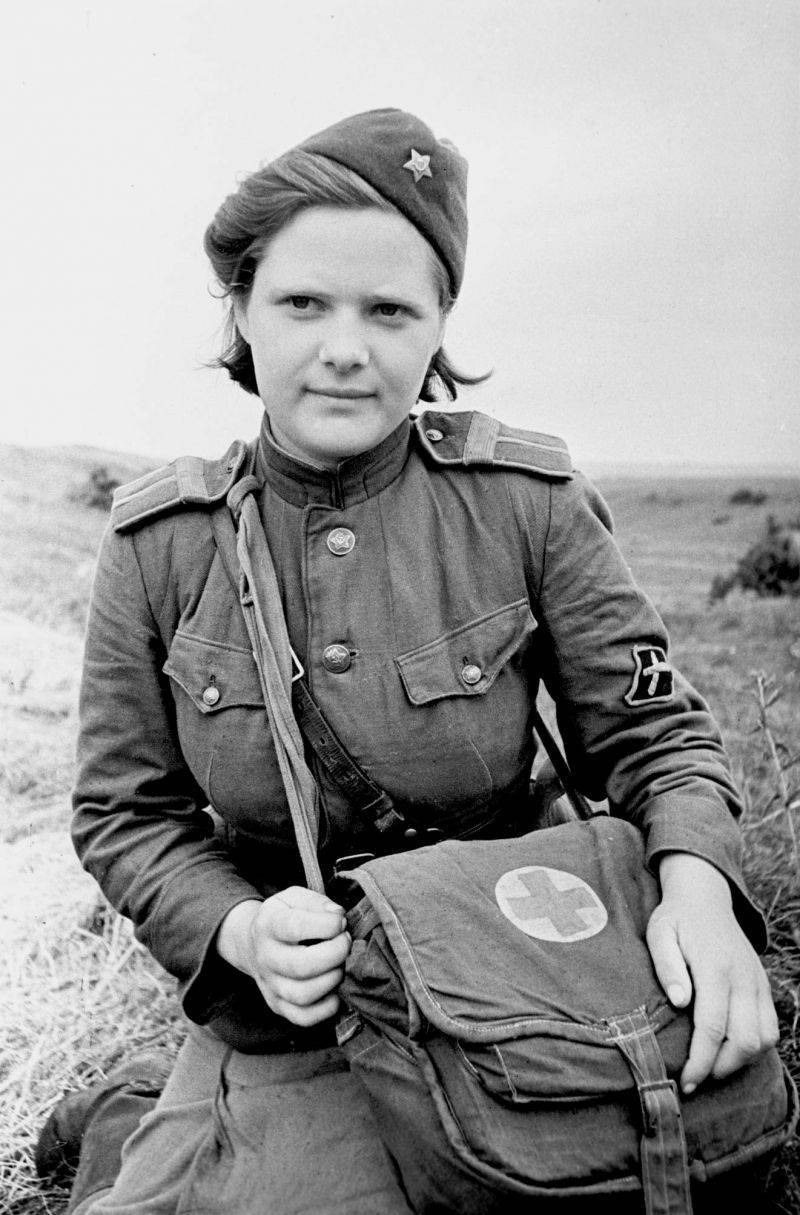
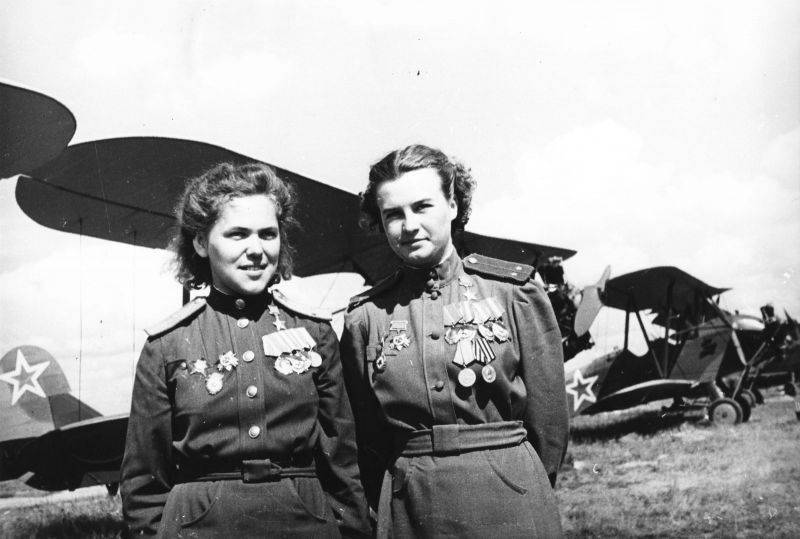
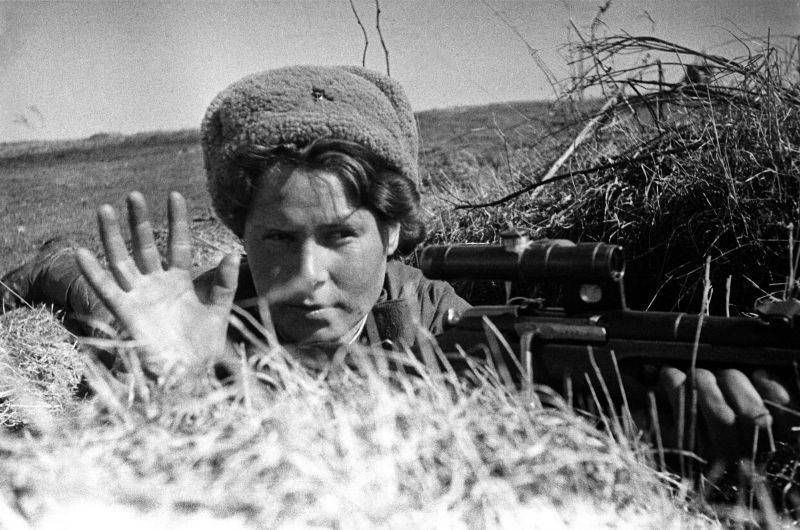
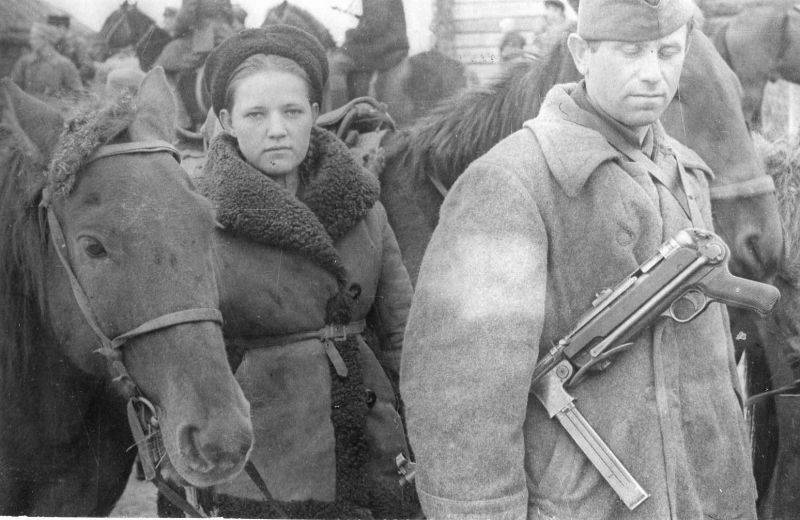
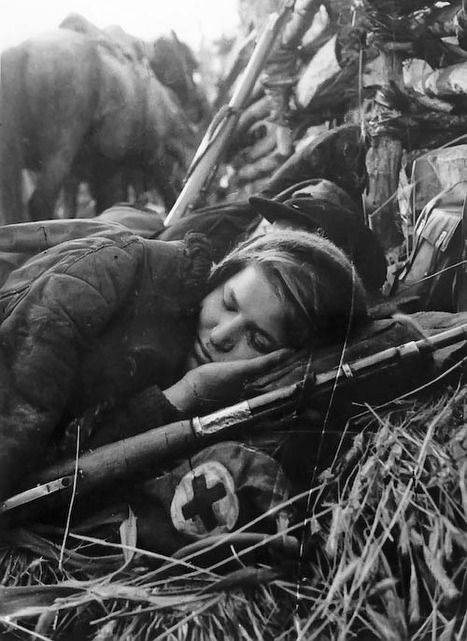
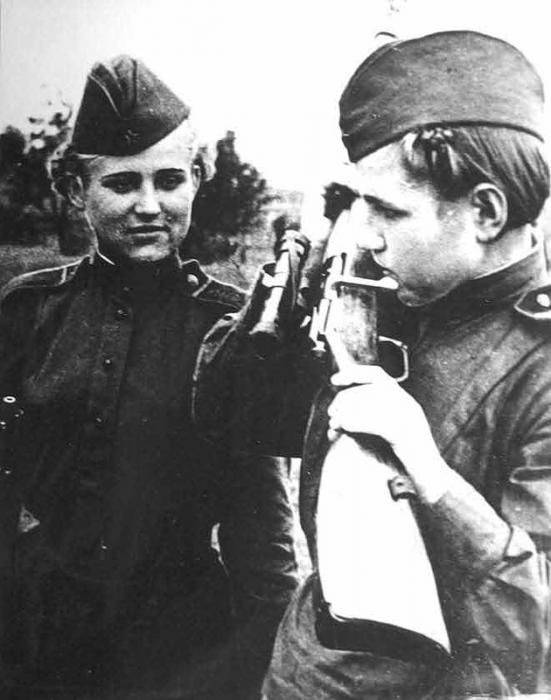
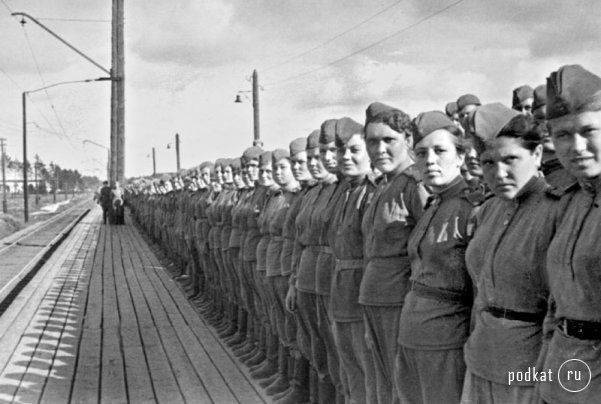
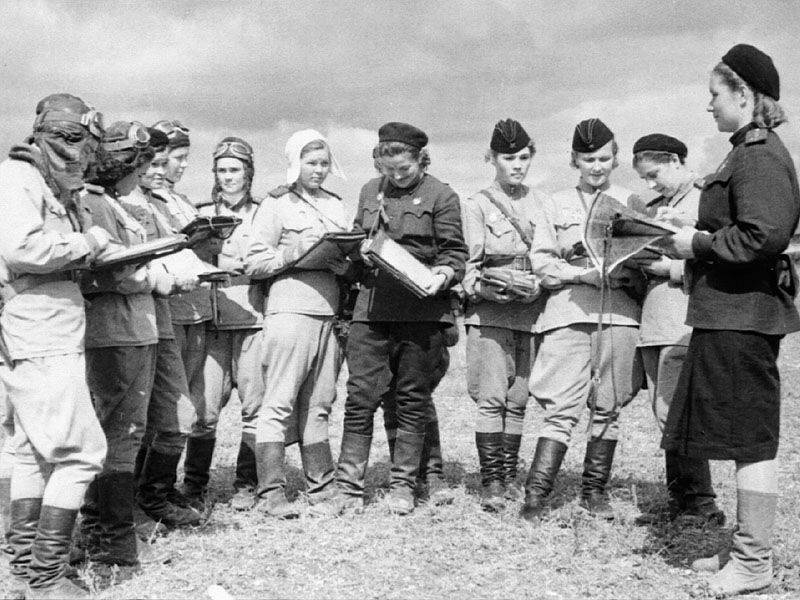
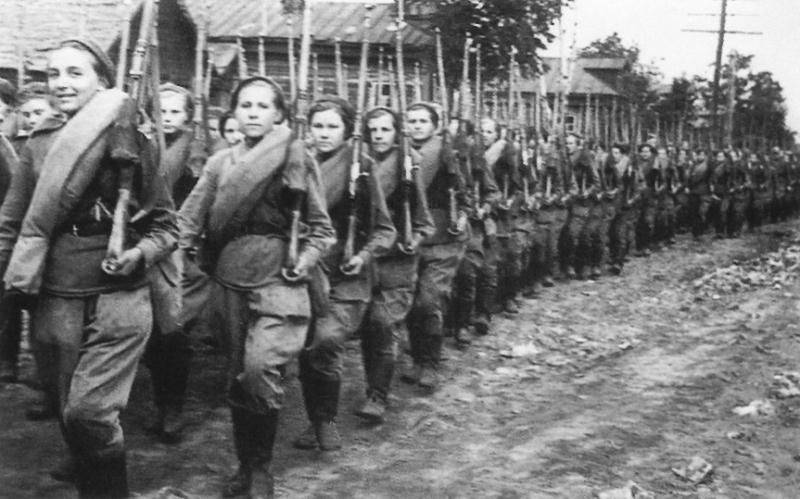
Information